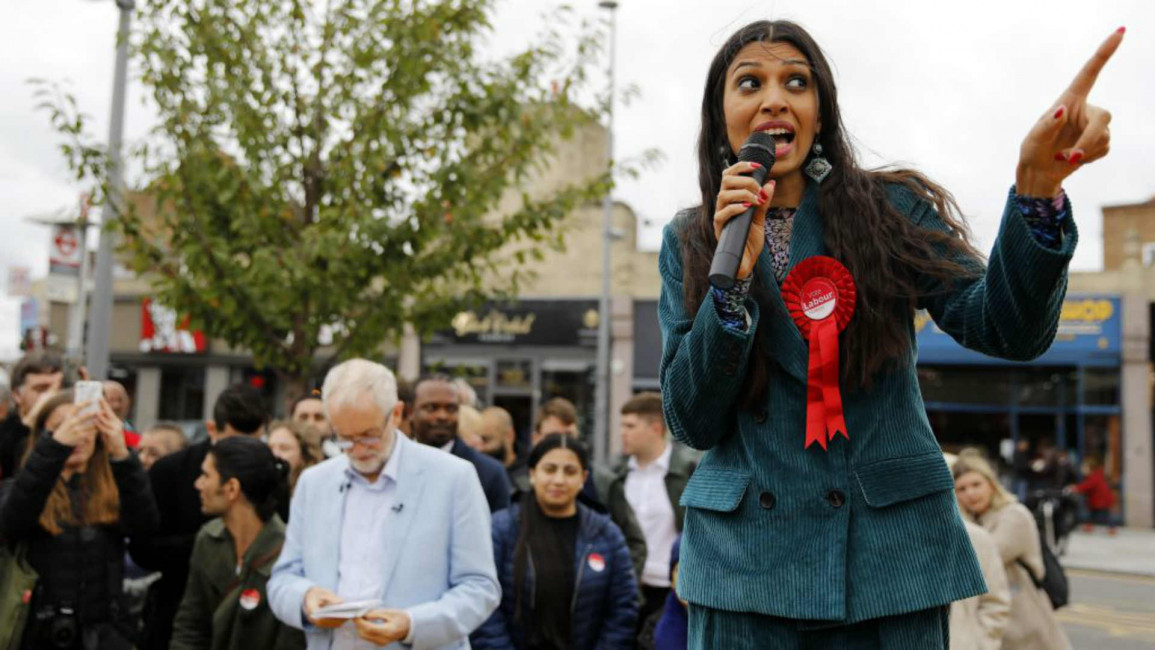
Stop holding Muslim women to impossible standards
Stop holding Muslim women to impossible standards
Comment: Labour parliamentary candidate Faiza Shaheen's religion and ethnic background apparently make her partly responsible for anything related to Muslims, writes Malia Bouattia.
5 min read
Labour parliamentary candidate Dr Faiza Shaheen speaks in East London [Getty]
The Liberal Democrat candidate for Chingford and Woodford Green, Geoffrey Seeff reminded us this week that racist tactics are still a weapon of choice by politicians in their scramble for power.
Seeff decided to write an open letter to Dr Faiza Shaheen - a Labour parliamentary candidate - on her views regarding charity, the Islamic Human Rights Commission (IHRC). It is not clear why Seeff made these demands from Dr Shaheen, given that no clear link between her and the organisation has been established either by him or others.
It is difficult, in these circumstances, not to read the move as a cheap shot at Dr Shaheen's identity as a Muslim woman, and an attempt at whipping up an Islamophobic reaction against her.
Dr Shaheen, who is also the director of the thinktank the Centre for Labour and Social Studies (CLASS), responded to Seeff over twitter, demanding why her identity was being targeted in such a way.
She writes, "I have never heard from Mr Seeff before, and his first correspondence is to try and highlight my Muslim identity and bracket me off with the behaviour of an organisation I have nothing to do with - indeed I've never heard of them, why would I have?"
The answer is, it seems, that her religion and ethnic background make her partly responsible for anything related to Muslims and Islam.
Indeed, in the context of the "War on Terror", which is nearing its twentieth anniversary, it has become increasingly normal to treat Muslims as a monolithic block, in which differences of politics, ideology, or tactics are somehow subsumed under the supposed unity of their faith.
The logic of policies ranging from Prevent to Schedule 7, as well as media witch hunts against Muslim individuals and organisations, are all premised on this logic: What any Muslim does can - at least potentially - be used to discipline, isolate, or attack any other Muslim, regardless of the links between the two.
I became sadly familiar with this with during my time as President of the National Union of Students. The forms of supposed political accountability I was submitted to went beyond anything remotely linked to my actions or political positions.
Individuals as well as political and media institutions, treated me like I should have expected and accepted being targeted more violently and mercilessly for daring to be an openly Muslim, women of colour on the left.
I had, for example, to endure months of being called an Islamic State (IS) sympathiser and an anti-Semite for having dared to express political disagreements with the dominant faction in the union over Palestine or anti-imperialism.
Of course, this is also an international trend. Across the Atlantic, the same is seen over and over again with the witch-hunt waged against Rashida Tlaib and Ilhan Omar.
Both women have repeatedly been at the centre of media attacks and singled out by right-wing politicians for their political stances on Palestine, foreign interventions, or the redistribution of political and economic power in the United States.
By targeting their representatives at every opportunity, the mainstream media and the right wing are signalling to all those who might want to follow suit - and have a lot of reasons to rebel and speak up - that doing so will come at a high personal price. This is especially true when they are expected to speak on behalf of, respond to actions carried out by, and be held accountable for the position of any and every other Muslim around.
Furthermore, it is worth pointing out that for Seeff to make statements such as: "The IHRC is nothing but a front for the mullahs of Tehran", about an organisation that researches and fights publicly against structural Islamophobia, is highly shocking and defamatory - to say nothing of the thinly veiled Islamophobic character of such a description.
What is more, Seeff apparently feels confident in making such a statement, despite the fact that a two-year long investigation by the Charity Commission led to absolutely no changes being asked of it. The charity was cleared of all accusations and permitted to continue its work. This, despite the highly politically motivated approach of the commission when dealing with Muslim-majority organisations.
When it comes to any Muslim space, you can open fire at will and let your imagination run wild it seems, and face little to no repercussions.
Shaheen pointed out the silence on the part of the media over her treatment, but I would extend this criticism to include the lack of coverage on the disproportionate targeting of Muslim organisations (both political, and not).
Indeed, we have almost become accustomed to a more aggressive targeting of Muslim groups and figures to such an extent that we expect it and normalise it. It is striking for example, that between January 2013 and April 2014 alone, 38 percent of all disclosed investigations by the Charity Commission targeted Muslim charities, leading us to understand that the issue is institutional.
The open letter by Seeff is yet another expression of a less and less accountable, right wing wave of attacks against Muslims, whose assumptions of collective guilt, collective responsibility, and collective punishment are based on - at best - thinly-veiled racism.
Muslim charities like the IHRC, Labour activists like Shaheen, and other Muslim progressive activists are certainly not the problem facing this country.
Instead, parties like Seeff's, which leverage all their access to power to increase poverty, inequality, and the suffering of the majority, are the ones who need to be held to account.
No amount of deflection to racialised and targeted minorities will stop Seeff and his friends from being held to account over their record come the next general election.
Seeff decided to write an open letter to Dr Faiza Shaheen - a Labour parliamentary candidate - on her views regarding charity, the Islamic Human Rights Commission (IHRC). It is not clear why Seeff made these demands from Dr Shaheen, given that no clear link between her and the organisation has been established either by him or others.
It is difficult, in these circumstances, not to read the move as a cheap shot at Dr Shaheen's identity as a Muslim woman, and an attempt at whipping up an Islamophobic reaction against her.
Dr Shaheen, who is also the director of the thinktank the Centre for Labour and Social Studies (CLASS), responded to Seeff over twitter, demanding why her identity was being targeted in such a way.
She writes, "I have never heard from Mr Seeff before, and his first correspondence is to try and highlight my Muslim identity and bracket me off with the behaviour of an organisation I have nothing to do with - indeed I've never heard of them, why would I have?"
The answer is, it seems, that her religion and ethnic background make her partly responsible for anything related to Muslims and Islam.
Indeed, in the context of the "War on Terror", which is nearing its twentieth anniversary, it has become increasingly normal to treat Muslims as a monolithic block, in which differences of politics, ideology, or tactics are somehow subsumed under the supposed unity of their faith.
The logic of policies ranging from Prevent to Schedule 7, as well as media witch hunts against Muslim individuals and organisations, are all premised on this logic: What any Muslim does can - at least potentially - be used to discipline, isolate, or attack any other Muslim, regardless of the links between the two.
 |
It has become increasingly normal to treat Muslims as a monolithic block |  |
Individuals as well as political and media institutions, treated me like I should have expected and accepted being targeted more violently and mercilessly for daring to be an openly Muslim, women of colour on the left.
I had, for example, to endure months of being called an Islamic State (IS) sympathiser and an anti-Semite for having dared to express political disagreements with the dominant faction in the union over Palestine or anti-imperialism.
Twitter Post
|
Of course, this is also an international trend. Across the Atlantic, the same is seen over and over again with the witch-hunt waged against Rashida Tlaib and Ilhan Omar.
Both women have repeatedly been at the centre of media attacks and singled out by right-wing politicians for their political stances on Palestine, foreign interventions, or the redistribution of political and economic power in the United States.
Read more: UK's racist 'Prevent' strategy failed once, and it will fail again
While they show incredible strength in their continued pursuit of the political objectives that make them the subject of such attacks, these smear tactics are also an ongoing attempt to discipline Muslim communities and communities of colour and police their political expression.By targeting their representatives at every opportunity, the mainstream media and the right wing are signalling to all those who might want to follow suit - and have a lot of reasons to rebel and speak up - that doing so will come at a high personal price. This is especially true when they are expected to speak on behalf of, respond to actions carried out by, and be held accountable for the position of any and every other Muslim around.
Furthermore, it is worth pointing out that for Seeff to make statements such as: "The IHRC is nothing but a front for the mullahs of Tehran", about an organisation that researches and fights publicly against structural Islamophobia, is highly shocking and defamatory - to say nothing of the thinly veiled Islamophobic character of such a description.
What is more, Seeff apparently feels confident in making such a statement, despite the fact that a two-year long investigation by the Charity Commission led to absolutely no changes being asked of it. The charity was cleared of all accusations and permitted to continue its work. This, despite the highly politically motivated approach of the commission when dealing with Muslim-majority organisations.
When it comes to any Muslim space, you can open fire at will and let your imagination run wild it seems, and face little to no repercussions.
 |
These smear tactics are an ongoing attempt to discipline Muslim communities and communities of colour, and police their political expression |  |
Indeed, we have almost become accustomed to a more aggressive targeting of Muslim groups and figures to such an extent that we expect it and normalise it. It is striking for example, that between January 2013 and April 2014 alone, 38 percent of all disclosed investigations by the Charity Commission targeted Muslim charities, leading us to understand that the issue is institutional.
The open letter by Seeff is yet another expression of a less and less accountable, right wing wave of attacks against Muslims, whose assumptions of collective guilt, collective responsibility, and collective punishment are based on - at best - thinly-veiled racism.
Muslim charities like the IHRC, Labour activists like Shaheen, and other Muslim progressive activists are certainly not the problem facing this country.
Instead, parties like Seeff's, which leverage all their access to power to increase poverty, inequality, and the suffering of the majority, are the ones who need to be held to account.
No amount of deflection to racialised and targeted minorities will stop Seeff and his friends from being held to account over their record come the next general election.
Malia Bouattia is an activist, a former president of the National Union of Students, and co-founder of the Students not Suspects/Educators not Informants Network.
Follow her on Twitter: @MaliaBouattia
Opinions expressed in this article remain those of the author and do not necessarily represent those of The New Arab, its editorial board or staff.




